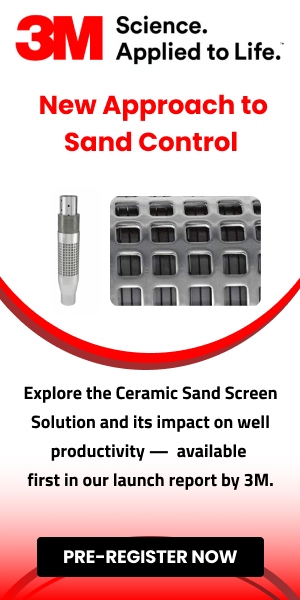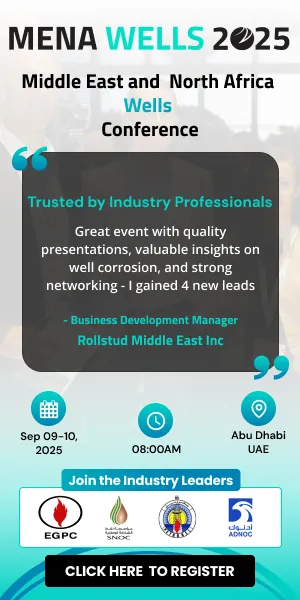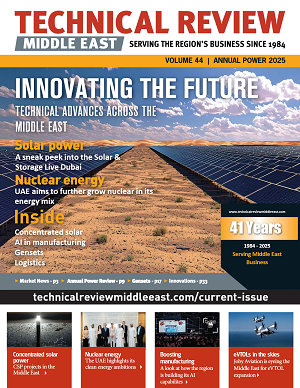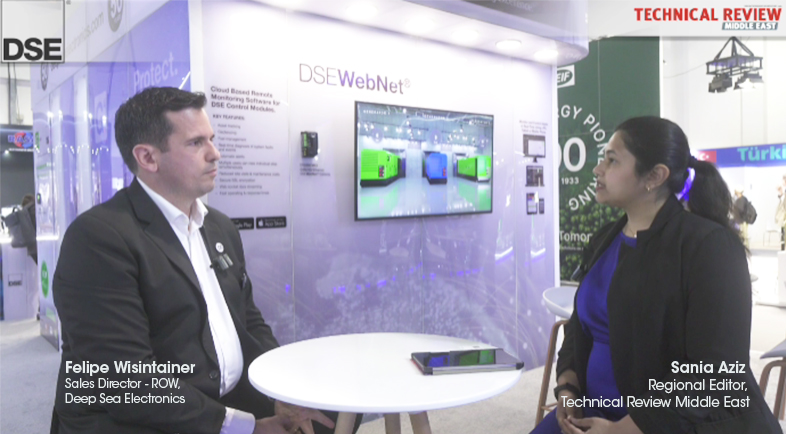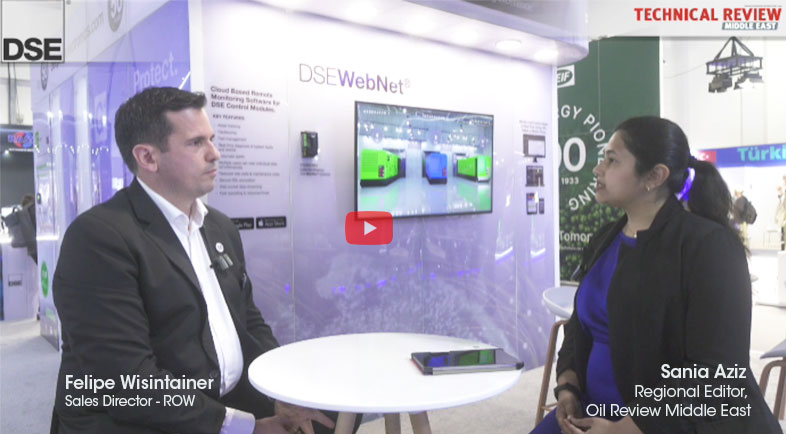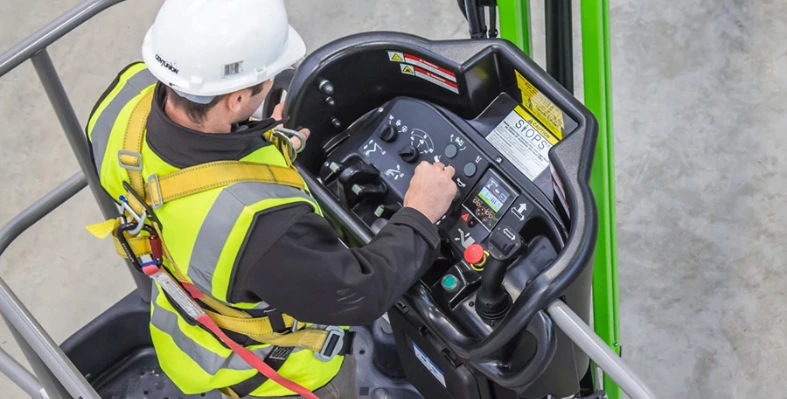In The Spotlight
ENEC and Framatome sign nuclear fuel supply deal for Barakah plant
The Emirates Nuclear Energy Company (ENEC) has signed a new fuel supply agreement with Framatome for the provision of nuclear fuel assemblies and engineering services for the Barakah Nuclear Energy Plant in the United Arab Emirates.
This agreement represents a major step in ENEC’s long-term strategy to diversify its nuclear fuel supply chain. It aims to reinforce the UAE’s energy security by maintaining a continuous supply of carbon-free electricity to businesses, industries, and households across the country.
Under the terms of the agreement, Framatome will provide fully fabricated nuclear fuel assemblies for the Barakah plant. With decades of expertise in nuclear fuel manufacturing, Framatome is seen as a strategic partner in supporting the resilience and flexibility of ENEC’s fuel supply operations, ensuring reliable performance and safety for the Barakah reactors.
The fuel assemblies will be manufactured at Framatome’s fabrication facility in the United States, which is licensed by the U.S. Nuclear Regulatory Commission (NRC). The facility has consistently earned the highest rating from the NRC’s Licensee Performance Review (LPR) for the past 18 years. Framatome also brings over four decades of experience in producing fuel for Combustion Engineering reactor designs like those used at Barakah and has supplied more than 6,000 such assemblies.
Supporting regional growth
The Barakah Nuclear Energy Plant is the first multi-unit nuclear facility in the region and a global example of a successful nuclear new-build programme. Developed by ENEC, the plant consists of four APR-1400 reactors and stands as the region’s largest clean electricity source. As ENEC looks ahead, it continues to explore strategic partnerships that support the growth of the international civil nuclear sector and ensure Barakah remains central to the UAE’s clean energy ambitions.
His Excellency Mohamed Al Hammadi, managing director and CEO of ENEC, said, “Our agreement with Framatome advances our strategy to strengthen the security and reliability of our nuclear fuel supply chain. Diversification is key to ensuring that we continue to deliver safe, clean, and reliable electricity—powering the sustainable growth of the UAE’s economy. Framatome’s expertise and commitment to international standards adds depth to our operations and reinforces Barakah as a global model for operational excellence in clean energy generation.
“We remain dedicated to advancing Barakah’s infrastructure and capabilities, continually striving for excellence in the nuclear power industry. ENEC continues to build on its existing operations through enhanced security, competitive costs, and innovative fuel solutions.”
“We are proud to provide our advanced fuel to ENEC, ensuring security of the supply and meeting the UAE’s clean energy goals,” said Grégoire Ponchon, CEO at Framatome. “The contract recognises our state-of-the-art technologies and the reliability of our workforce to provide exceptional services to our customers.”
Also read: Nuclear renaissance: UAE leads the way in clean energy transformation
ALEC secures BIM Kitemark recertification for third consecutive year
ALEC, one of the Middle East’s leading construction companies, has once again achieved the BIM Kitemark recertification from BSI.
This marks the third consecutive year it has met the global benchmark for excellence in Building Information Modelling (BIM) and information management under the ISO 19650 series of standards.
The achievement reinforces ALEC’s position at the forefront of digital transformation in construction, aligning with findings from the McKinsey Global Institute, which show that technology and innovation can enhance construction sector productivity by up to 60%.
Recognised globally as one of the most rigorous certifications for information management, the BIM Kitemark requires companies to pass a detailed audit.
ALEC was assessed on its ability to meet client information requirements, maintain accuracy and consistency, enable effective supply chain collaboration, and comply with the ISO 19650 framework.
This recertification not only validates ALEC’s ability to lead digital delivery but also reflects its role in raising industry standards.
VR and other tools
Throughout the past year, ALEC has advanced its Innovation Strategy, supported by focused Digital and IT strategies. Technology and automation remain central to its approach, with initiatives such as a new ERP system to streamline internal processes, expanded use of HoloBuilder, and the introduction of ‘Resolve’, a VR tool integrated with Revizto’s issue tracker.
In parallel, ALEC continues to scale the use of Morta, a data structuring and standardisation platform that allows the company to digitalise ISO 19650 documentation and improve project oversight across design change, procurement, and risk management.
Through this sustained focus on digital innovation, ALEC is not only enhancing its operational performance but also shaping the future of construction in the region.
Barry Lewis, CEO at ALEC, said, “Innovation is part of our DNA, and securing this BIM recertification for a third consecutive year highlights how deeply embedded our digital-first mindset has become. We see enormous growth potential in the region, particularly in the UAE and Saudi Arabia, and our ongoing investments in innovation and digital excellence enable us to remain agile, deliver the highest quality projects, and capitalise on these opportunities.”
Andy Boutle, head of digital construction at ALEC, said, “We see this recertification as another step on a much broader journey. The regional industry has made great strides in BIM adoption, but there’s still a gap to bridge to reach the next level of utilisation and maturity in line with international standards. At ALEC, we’re committed to helping close that gap, not just within our own projects but also by leading by example and encouraging our partners and clients to embrace a digital-first mindset. In the months ahead, we’ll continue to focus on building seamless interconnectivity between our digital solutions, creating a more data-driven, efficient, and sustainable way of delivering projects.”
AVEVA unveils product impact metrics in latest sustainability report
AVEVA, a global leader in industrial software, has published its 2024 Sustainability Report, providing a comprehensive update on its progress towards sustainability goals and its expanding green product roadmap.
The report highlights how AVEVA’s software solutions, designed to unify trusted information and insights, are helping industries drive the responsible and efficient use of the world’s resources.
The report outlines strong progress across all three pillars of AVEVA’s sustainability framework: technology handprint, operational footprint, and inclusive culture. In 2024, AVEVA sustained a 93% reduction in scope 1 and 2 greenhouse gas emissions compared to its baseline year. This achievement was made possible through a series of strategic actions, including a continued shift to renewable energy sources, careful optimisation of office space, and improvements in fleet management.
“We believe that sustainability and business success go hand in hand,” said Caspar Herzberg, CEO, AVEVA. “We’re focused on helping our customers harness the full potential of industrial intelligence, bringing visibility and insight to complex data and processes. This empowers the industry to achieve measurable improvements in both efficiency and productivity, unlocking significant savings in costs, emissions and resource requirements. AVEVA’s 2024 Sustainability Report demonstrates the strides we’ve made to deepen our technology handprint, reduce our operational footprint and advance our inclusive culture.”
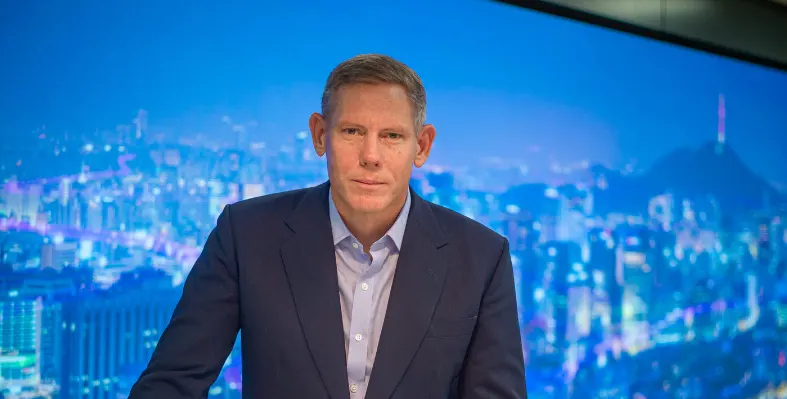
Caspar Herzberg, CEO, AVEVA
Demonstrating its commitment to sustainable software development, AVEVA completed a maturity assessment of its entire product portfolio against the principles of the Green Software Foundation. Additionally, 85% of its products underwent power bench testing to evaluate energy consumption, laying the groundwork for future enhancements and ensuring alignment with green software principles.
Recognising that the greatest climate impact lies in the use of its technology, AVEVA also introduced a new annual metric for saved and avoided emissions. This figure reflects the measurable energy savings generated by a specific portion of its product suite. The company has committed to further refining this methodology and expanding its coverage in the coming years, reinforcing the real-world impact its software has on supporting decarbonisation.
AVEVA’s 2024 Sustainability Report demonstrates how digital innovation can drive sustainable transformation across industries, supporting global efforts to address climate change while improving operational efficiency.
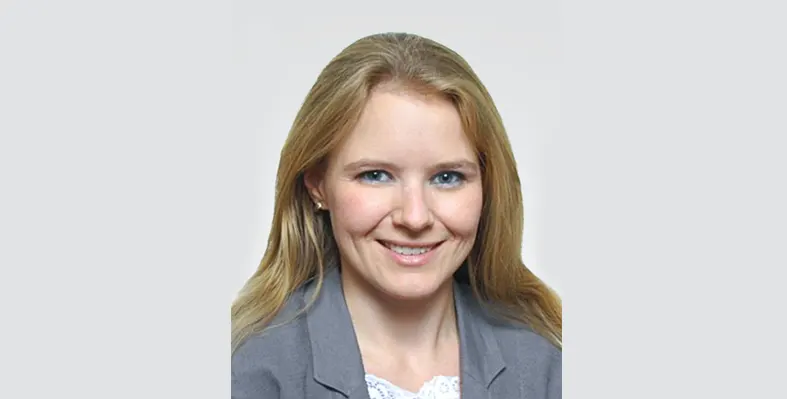
Lisa Wee, CSO, AVEVA
“As we enter the final year of our 2025 targets, we’re focused on meeting our goals and chartering an even bolder path with our sustainability framework. We know that the biggest impact comes from our software handprint – how we work with our customers to enable them to drive decarbonisation, become more resilient and support circularity. This is why we’re publicly reporting our 2024 customer saved and avoided emissions data for select industry sectors. We’re committed to expanding our methodology to capture and quantify our broader impact. At AVEVA, we are continuing to advance towards a sustainable future, driving digital transformation through our software and leading by example with responsible operations,” said Lisa Wee, CSO, AVEVA.
AVEVA's full report can be accessed here: https://www.aveva.com/sustainability-report/
TECNA
Venue:
Rimini, Italy
Dates:
24-27 September 2024
Website:
https://www.tecnaexpo.com/
ENEC and Framatome sign nuclear fuel supply deal for Barakah plant
The Emirates Nuclear Energy Company (ENEC) has signed a new fuel supply agreement with Framatome for the provision of nuclear fuel assemblies and engineering services for the Barakah Nuclear Energy Plant in the United Arab Emirates.
This agreement represents a major step in ENEC’s long-term strategy to diversify its nuclear fuel supply chain. It aims to reinforce the UAE’s energy security by maintaining a continuous supply of carbon-free electricity to businesses, industries, and households across the country.
Under the terms of the agreement, Framatome will provide fully fabricated nuclear fuel assemblies for the Barakah plant. With decades of expertise in nuclear fuel manufacturing, Framatome is seen as a strategic partner in supporting the resilience and flexibility of ENEC’s fuel supply operations, ensuring reliable performance and safety for the Barakah reactors.
The fuel assemblies will be manufactured at Framatome’s fabrication facility in the United States, which is licensed by the U.S. Nuclear Regulatory Commission (NRC). The facility has consistently earned the highest rating from the NRC’s Licensee Performance Review (LPR) for the past 18 years. Framatome also brings over four decades of experience in producing fuel for Combustion Engineering reactor designs like those used at Barakah and has supplied more than 6,000 such assemblies.
Supporting regional growth
The Barakah Nuclear Energy Plant is the first multi-unit nuclear facility in the region and a global example of a successful nuclear new-build programme. Developed by ENEC, the plant consists of four APR-1400 reactors and stands as the region’s largest clean electricity source. As ENEC looks ahead, it continues to explore strategic partnerships that support the growth of the international civil nuclear sector and ensure Barakah remains central to the UAE’s clean energy ambitions.
His Excellency Mohamed Al Hammadi, managing director and CEO of ENEC, said, “Our agreement with Framatome advances our strategy to strengthen the security and reliability of our nuclear fuel supply chain. Diversification is key to ensuring that we continue to deliver safe, clean, and reliable electricity—powering the sustainable growth of the UAE’s economy. Framatome’s expertise and commitment to international standards adds depth to our operations and reinforces Barakah as a global model for operational excellence in clean energy generation.
“We remain dedicated to advancing Barakah’s infrastructure and capabilities, continually striving for excellence in the nuclear power industry. ENEC continues to build on its existing operations through enhanced security, competitive costs, and innovative fuel solutions.”
“We are proud to provide our advanced fuel to ENEC, ensuring security of the supply and meeting the UAE’s clean energy goals,” said Grégoire Ponchon, CEO at Framatome. “The contract recognises our state-of-the-art technologies and the reliability of our workforce to provide exceptional services to our customers.”
Also read: Nuclear renaissance: UAE leads the way in clean energy transformation
TAQA Water Solutions explores Danish expertise in circular water systems
A senior delegation from TAQA Water Solutions has completed a technical tour of Denmark organised by the Water Efficiency Middle East Alliance (WEMA) and supported by the Danish Trade Council, aiming to advance knowledge sharing around sustainable water infrastructure.
Held at a time of heightened focus on water security across the GCC, the visit connected Emirati and Danish water sector leaders to exchange proven strategies for wastewater reuse, energy optimisation, and circular economy practices. The tour aligned with key regional frameworks, including the UAE Water Security Strategy 2036, Net Zero 2050, and Saudi Vision 2030.
With Denmark widely recognised as a pioneer in sustainable utilities, TAQA representatives were given access to in-depth case studies and operational insights that hold strong relevance for Middle Eastern utilities working to meet rising demand with lower environmental impact.
Throughout the visit, TAQA executives engaged directly with Danish utilities, technology companies, and research institutions. Roundtable discussions and site visits were hosted by WEMA member companies such as Grundfos, Danfoss, DHI, NIRAS, Aquaterra, AVK, Watopi, and Aarhus Vand.
Focus areas included sludge and odour management, advanced wastewater reuse, energy-efficient pumping systems, stormwater resilience, and smart digital platforms to improve asset performance.
A highlight of the programme was a dedicated knowledge session with BIOFOS, Denmark’s largest wastewater utility, and Aarhus Water Utility, which is at the forefront of customer-centric water services and climate-adaptive infrastructure.
Groundwork for collaboration
The visit identified clear pathways for deeper technical cooperation, including feasibility assessments for Danish technologies in the GCC and potential pilot projects that demonstrate real-world impact.
TAQA Water Solutions outlined key priorities such as enhancing operational energy efficiency, solving infiltration challenges, and managing complex large-scale pumping requirements, areas where Danish innovation can play a significant role.
As WEMA continues to bridge connections between the Gulf and global water leaders, the mission underlined how structured knowledge exchange can unlock scalable solutions for more resilient, efficient, and future-ready water networks in the region.
“This delegation was more than a visit, it was a strategic exchange of ideas, technology, and shared ambition,” said Astrid SC Nielsen, the Danish Trade Council, Dubai. “TAQA Water Solutions’ commitment to innovation, coupled with Denmark’s decades of water expertise, are the seeds for impactful, long-term collaboration.”
“At TAQA Water Solutions, we have experienced firsthand how innovation profoundly drives comprehensive sustainability. It extends far beyond merely securing vital water and energy systems; it is the fundamental cornerstone reinforcing a resilient circular economy. This strategic imperative ensures that every precious drop is meticulously collected, expertly treated, and purposefully reused, thereby setting new benchmarks for responsible resource management and ensuring a water-secure future,” said Eng. Ahmed Al Shamsi, CEO of TAQA Water Solutions.
He added, “As part of TAQA Group's commitment to providing energy and water to communities worldwide, TAQA Water Solutions drives sustainable development and secures global water resources through strategic investments and collaborative partnerships in markets of growth. This visit exemplifies this mission, evolving beyond a technical exchange, profoundly deepening our shared commitment to advancing sustainable water solutions globally. We are grateful for the generous knowledge-sharing and the invaluable opportunity to learn from a community that has seamlessly integrated sustainability into its daily life, underscoring our belief that innovation truly thrives through reciprocal collaboration.”
Also read: How does the UAE support island nations' water security?
Riyadh awards contracts for metro Line 2 extension
Saudi Arabia’s Royal Commission for Riyadh City (RCRC) has awarded a major contract worth up to US$900mn to the ArRiyadh New Mobility Consortium for the construction of the Line 2 extension of the Riyadh Metro project, according to a report by MEED.
The consortium includes several international heavyweights such as Italy’s Webuild, India’s Larsen & Toubro (L&T), Saudi-based Nesma & Partners, Japan’s Hitachi, Italy’s Ansaldo STS, Canada’s Bombardier, Spain’s Idom, and Australia’s WorleyParsons.
The Line 2 extension will span 8.4 km. This includes a 1.3 km elevated and a 7.1 km underground extension.
It will also feature five stations, two elevated and three underground. The line will run from the current King Saud University (KSU) terminus to KSU Medical City, KSU West, Diriyah East, Diriyah Central (interchanging with the planned Line 7), and ending at Diriyah South.
Last year, the BACS Consortium had delivered the first phase of the Riyadh Metro. This consortium also included global engineering, construction, and project management company Bechtel.
Project awards
Project management and construction supervision will be handled by Riyadh Metro Transit Consultants (RMTC), a joint venture of US-based Parsons and French engineering firms Egis and Systra. RMTC also provided project oversight for Lines 1, 2, and 3 during the first phase of the metro’s development.
Once complete, the Riyadh Metro will become the world’s longest driverless metro system, spanning 176 km with 85 stations and seven depots. The six-line network includes the Blue, Red, Orange, Yellow, Green, and Purple lines.
The phased rollout of the network has progressed steadily. The Orange Line began operations in January this year, following the Red and Green lines which launched in December 2024. The Red Line (Line 2) runs 25.1 km from east to west along King Abdullah Road, connecting King Fahd Sports City with King Saud University and includes 15 stations.
The Green Line (Line 5) stretches 13.3 km, connecting King Abdullah Road with the National Museum, and serves key ministries such as Defence, Finance, and Commerce. In the same month, operations also began on the Blue (Line 1), Yellow (Line 4), and Purple (Line 6) lines.
Also read: Giza Station foundation work underway
Alcoa exits Ma’aden joint venture in US$1.35bn deal
Alcoa Corporation has finalised the sale of its 25.1% stake in the Ma’aden joint venture to Saudi Arabian Mining Company (Ma’aden), marking a strategic exit from the integrated mining complex the two companies launched in 2009.
The transaction was completed under a binding share purchase and subscription agreement.
In exchange, Alcoa received around 86 million Ma’aden shares, valued at approximately US$1.2bn, alongside US$150mn in cash, which will primarily be used to cover taxes and transaction costs.
The company expects to report a gain of roughly US$780mn under other income for the third quarter of 2025.
In line with past asset sales, this gain will be recorded as a special item.
Saudi mining growth
Alcoa, which is based in Pittsburgh in Pennsylvania, is a global leader in bauxite, alumina, and aluminium products. It will now hold an estimated 2% of Ma’aden’s outstanding shares.
As stipulated in the agreement, these shares must be retained for a minimum of three years, with one-third eligible for sale after each of the third, fourth, and fifth anniversaries of the transaction’s closing.
However, under certain conditions, Alcoa is allowed to hedge or borrow against the shares during the holding period, and the lock-up may be reduced in specific scenarios.
The Ma’aden joint venture, established as a fully integrated aluminium production complex in Saudi Arabia, comprises the Ma’aden Bauxite and Alumina Company (MBAC) and the Ma’aden Aluminium Company (MAC).
Prior to the deal, Ma’aden held a 74.9% majority stake.
Citi served as Alcoa’s exclusive financial advisor for the transaction, while legal counsel was provided by White & Case LLP.
“While today marks the end of the Joint Venture, the closing of this transaction demonstrates the initial value to our shareholders and enables visibility within Alcoa’s financials until we monetize in the future,” said William F. Oplinger, Alcoa’s president and CEO.
“I thank Ma’aden’s leadership and the Kingdom of Saudi Arabia for their partnership over the last 16 years, and we look forward to continued engagement as Ma’aden shareholders.”
Also read: Power Metallic gets licensed to explore Saudi mineral belt
Oman Cables Industry earns EPD certification for key product lines
In a move that underscores its sustainability leadership in the region, Oman Cables Industry (OCI) has achieved Environmental Product Declarations (EPDs) for its main cable families.
This milestone reinforces OCI’s role as both a regional leader in sustainable practices and a provider of comprehensive infrastructure solutions.
The EPD certifications offer a significant advantage to OCI’s customers by helping them meet rising demands for environmental transparency and carbon accountability across sectors such as construction, utilities, and infrastructure.
With these certifications in place, OCI enables stakeholders to build more responsibly, drive sustainable innovation, and stay ahead in an increasingly climate-conscious market.
The EPDs were independently verified and published by EPD Norge, developed in accordance with cable-specific Product Category Rules (PCRs).
Investing in ESG frameworks
These declarations present a rigorous, science-based account of each product’s environmental footprint, covering its entire lifecycle from raw material extraction to disposal.
As sustainability and carbon reporting become increasingly important for procurement decisions, regulatory compliance, and access to green financing, verified EPDs are proving essential.
They also support adherence to internationally recognised green building certification systems such as LEED and Estidama, as well as aligning with broader ESG investment frameworks.
OCI's EPD-backed products help customers achieve environmental standards and demonstrate climate action, whether for government infrastructure or private projects. This result enhances OCI's eligibility for worldwide and regional green tenders, and supports Oman's economic transformation under Vision 2040.
“At OCI, sustainability is not a campaign, it’s a core business principle,” said Erkan Aydogdu, CEO of Oman Cables Industry. “Securing EPD certification reflects our continued commitment to operational transparency, responsible growth, and long-term stakeholder value. We’re committed to empowering our customers and partners with the data they need to compete in tomorrow’s markets. And this is just the beginning more EPD certifications are underway.”
OCI’s verified EPDs are publicly accessible through the EPD Norge website.
“We’re not just manufacturing cables, we’re enabling the next generation of infrastructure with purpose, performance, and accountability,” Aydogdu added.
Also read: OCI shares financial results; announces new board members










